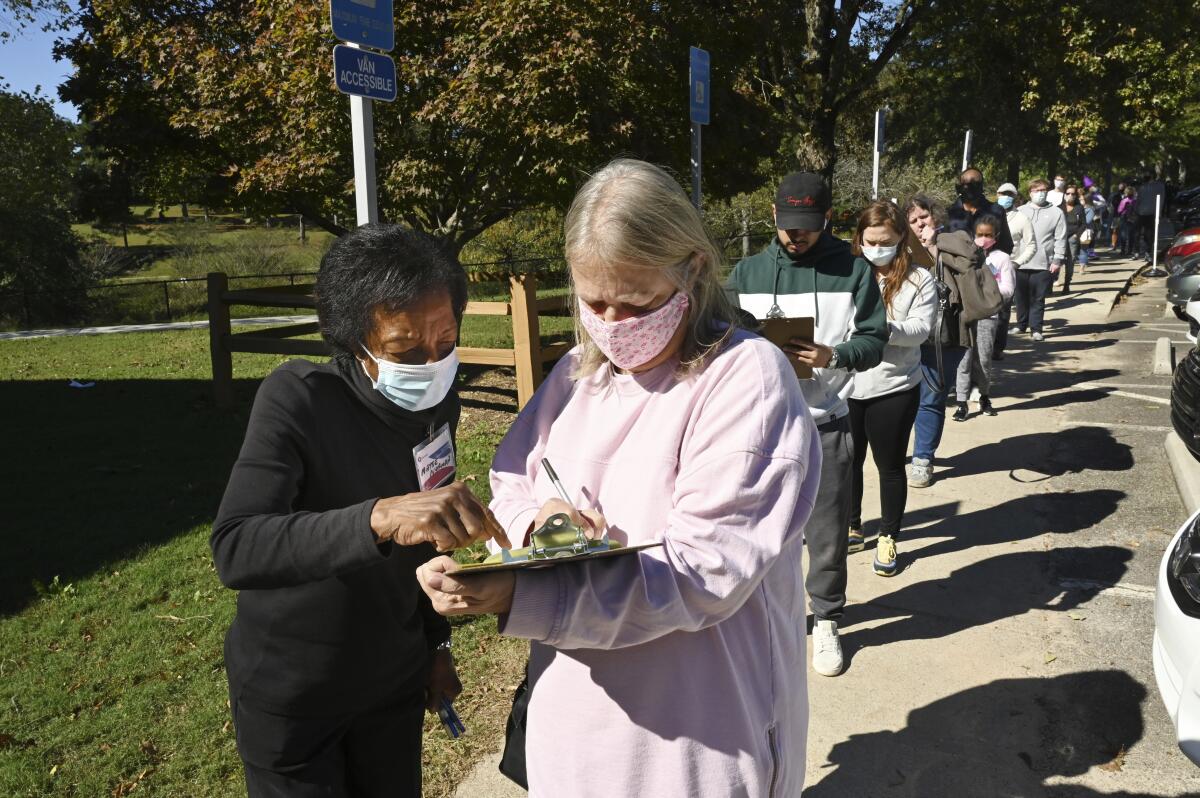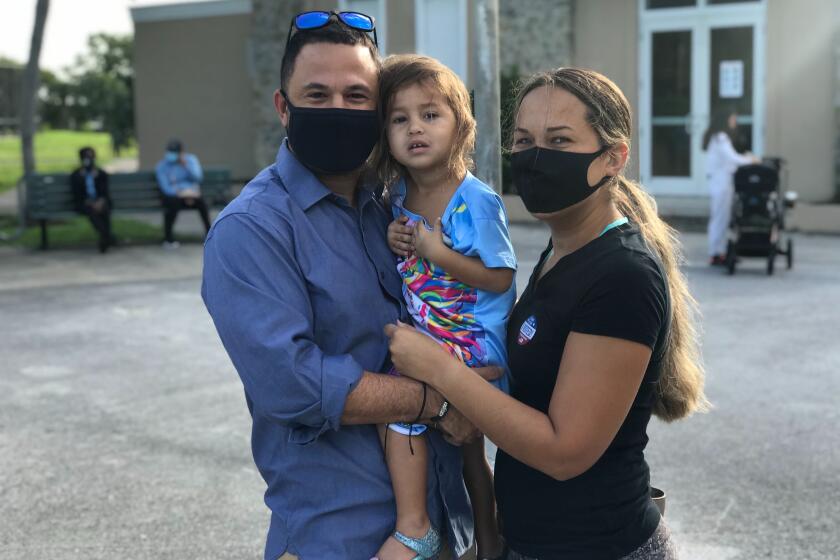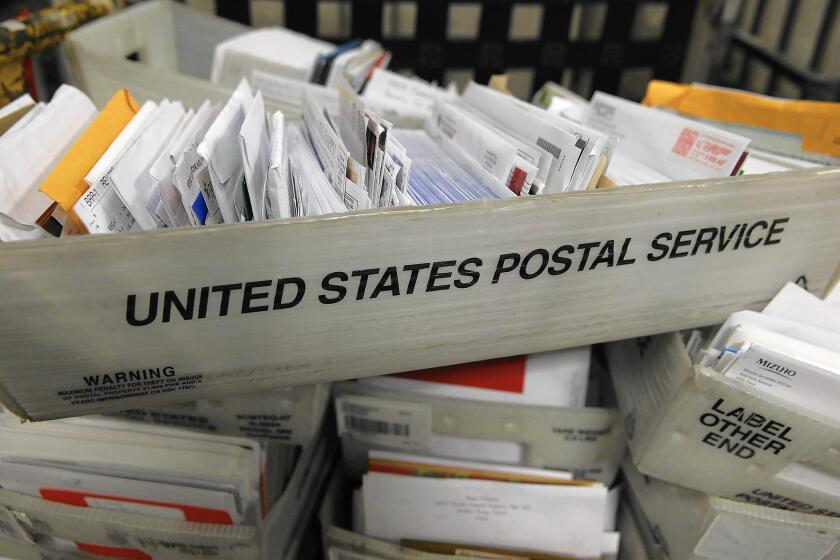In a rapidly changing Georgia, turnout is breaking records, but who is showing up to vote?

ATLANTA — Over the last few years, Nse Ufot has worked to reshape the political landscape of Georgia, leading a new generation of grass-roots voting rights activists to fan out across the state and register hundreds of thousands of young, Black and brown voters.
As she watches Joe Biden and President Trump deadlocked in this long conservative Southern stronghold, where a Democrat has not won a presidential race since 1992, she feels a certain measure of vindication.
Polls show margins so tight that Trump on Sunday touched down on Georgia, a state he won comfortably by 5 percentage points in 2016.
“That tells me that what we’ve been saying all along is true: Georgia is America’s newest battleground state,” said Ufot, the executive director of the New Georgia Project, a nonpartisan group founded by Stacey Abrams, a former Democratic gubernatorial candidate, to register and engage voters.
Early voter turnout has been historic in Georgia. After polling stations wrapped up early voting on Friday night, the state reported that more than 3.9 million people had cast ballots, not far off the total 4.1 million turnout in the last presidential election. Secretary of State Brad Raffensperger has predicted that this year’s total could near 6 million.
“The scope and the scale and the size of the New Georgia Project large-scale voter registration effort has expanded the electorate and fundamentally changed who shows up to vote,” Ufot said. “Now the electoral outcomes are going to be different — and it is going to be determined by not only who shows up to vote, but whose vote counts.”
President Trump and Joe Biden battled into Wednesday morning with no clear winner, as major contests remained too close. Biden urged patience, while Trump called the election into question.
But while Georgia’s demographic and political makeup is shifting and turnout has already broken records, a Democratic win is not inevitable. As many celebrate the fact that 1 million Black Georgians have already cast ballots — up from 712,000 this time four years ago — some note that Black votes are low in proportion to those of white people.
Traditionally the backbone of the state’s Democratic Party, Black voters represent 29.8% of the overall early voting tally so far, slightly lower than turnout at this point in 2016 and nearly two points lower than in 2018, according to Tom Bonier, chief executive at TargetSmart, a Democratic political data firm. Black people make up 32.6% of Georgia’s population and 32% of registered voters. The turnout percentage could fall, as polling suggests Republicans are more likely than Democrats to vote Tuesday.
“This is not the kind of scenario the Democrats were hoping for,” said Charles Bullock, a professor of political science at the University of Georgia. “Black voters are key to Democratic success in the South.”
Typically, Bullock said, a Democrat who needs to win a statewide race in Georgia must follow the “30-30” rule: increase Black voter turnout to 30% of the electorate and win at least 30% of the white vote.
“Yes, lots of Black people are voting,” he added. “Well, lots of whites are voting also. What we’re seeing here is Democrats are missing a key component of what they need if they’re going to flip the state.”
Election 2020: Our reporters, dispatched to more than a dozen cities in battleground states, are asking voters what brought them out to the polls.
Some note that it is too soon to count early Black turnout as a large number of Black voters planned to vote by mail and thousands of requested absentee ballots have yet to be received. Others raise the state’s history of voter suppression, questioning how the secretary of state’s office is managing the information that’s coming out of the counties and sharing early voting information.
“We have a secretary of state that has spent untold sums of money fighting all the community organizations and Georgia voters in court,” Ufot said. “They’ve literally constructed hurdles to make it difficult for people to participate and to shrink the electorate and to discourage participation, so it is not irrational for someone to question how they are recording the data.”
Some point out that Black voters also face more hurdles in voting.
Andrea Young, executive director of the American Civil Liberties Union of Georgia, said that low-income Black voters working multiple jobs or lacking transportation were disproportionately affected by the long lines that plagued some polling stations in metro Atlanta in the first days of early voting and stormy weather that forced some polling stations to close last week.
“For people who punch a time clock or who take public transportation, these things like long lines really are voter suppression,” she said. “The turnout is a real testament to how determined people are to have their voices heard even despite all the barriers they face.”
Voting news from around the country
Still, some political data experts say that as the state’s demographics shift, Black voters don’t necessarily have to make up 30% of the vote if Democrats can capture a higher number of suburban college-educated whites and drum up more votes from the tiny but surging Hispanic and Asian populations. Collectively, Hispanics and Asians represent barely more than 5% of Georgia turnout so far, but even that is significantly higher than 2016.
“In the end, it’s conceivable that Black voters will represent a smaller share of the electorate and still, the electorate will be more Democratic than it’s ever been and could deliver a Democratic victory,” Bonier said. “I think that’s potentially the most likely scenario at this point.”
Over the last decade, Georgia’s population has swelled from 9.6 million to 10.6 million as a growing number of Asians and Latinos have moved to the state and Black people have migrated here from Northern cities. About 10% of its population is now foreign born, and the state has the nation’s fastest-growing number of immigrants eligible to vote.
In 2012, Mitt Romney won Georgia by 8 percentage points; in 2016, Trump won by 5. Two years later, the margin between then-Secretary of State Brian Kemp and Democrat Stacey Abrams in the state’s gubernatorial race was just 1.4%. (Abrams refused to concede, accusing Kemp, who presided over the election, of voter suppression and “gross mismanagement” for purging hundreds of thousands of voters from electoral rolls, closing precincts and overseeing a system in which voters at predominantly nonwhite precincts waited in long lines.)
As the margins have closed, debate has raged among Democrats about how to win this rapidly diversifying Southern state: focus on persuading moderate white swing voters who abandoned the party for Republicans or try to drum up turnout and build a new coalition of young and minority voters?
“The biggest swing voters are voters who swing between voting and not voting at all,” Ufot said. “While people obsess about the fabled Obama-Trump supporters, there were 100 million Americans who were eligible to vote but didn’t vote in 2016.”
In the last six years, the New Georgia Project has registered about 450,000 Black, Latino, Asian American and young voters. Georgia, she said, leads the nation in youth voter registration, with a 34% jump from 2016 to 2020.
Michael Thurmond, the chief executive of DeKalb County, a predominantly Black metro Atlanta county, said he thought Biden had embraced a smart strategy of appealing to the base of Black voters and reaching out to white seniors worried about healthcare and struggling to put food on the table.
“Georgia is obviously becoming more diverse and the electorate is becoming younger,” he said. “Be that as it may, we’re not there yet. What you still have to do is what Joe Biden is doing: reach out to older white and conservative voters.”
Democrats, at least, can take consolation that they are not alone in worrying about whether they will win Georgia. A campaign advisor close to the president who is otherwise fairly upbeat said Georgia is the state that most concerns him: “That state is just slipping slowly blue.”
While some Republicans in Georgia said they are not worried about a Democratic win, many are jittery.
“The race is far closer than either side would like right now,” said Erick Erickson, a conservative radio talk show host who lives in Macon. A Never Trumper in 2016, Erickson put aside his reservations about Trump’s character and endorsed him last year.
“There’s not a lot of optimism left about the president,” he said last week. “It looks like they’re going to get clocked in the suburbs. How do you get suburban voters back without losing the blue-collar coalition that got the president elected in 2016?”
Staff writer Noah Bierman in Washington contributed to this report.
More to Read
Get the L.A. Times Politics newsletter
Deeply reported insights into legislation, politics and policy from Sacramento, Washington and beyond. In your inbox three times per week.
You may occasionally receive promotional content from the Los Angeles Times.













